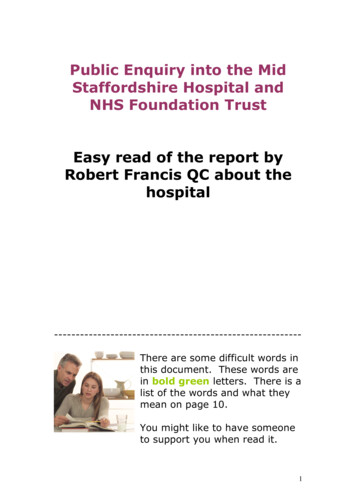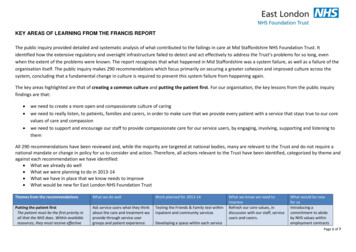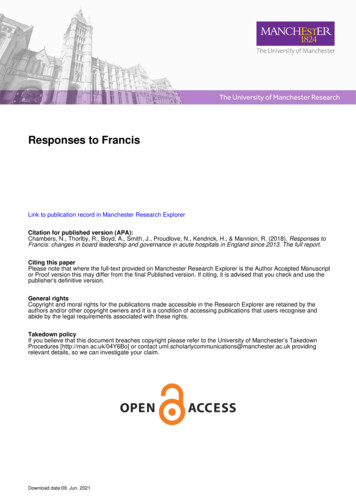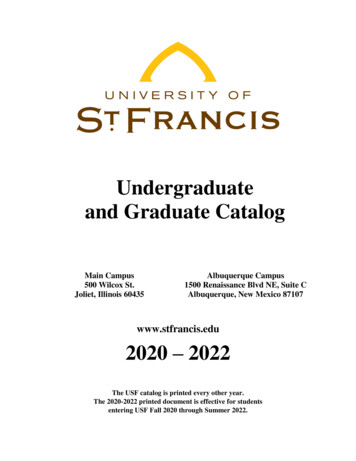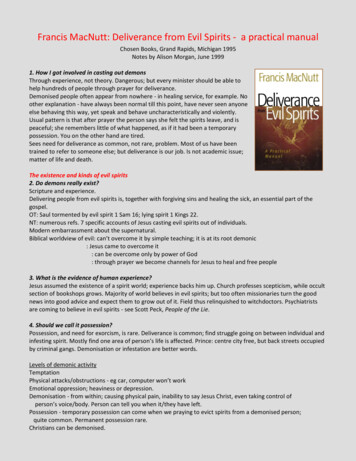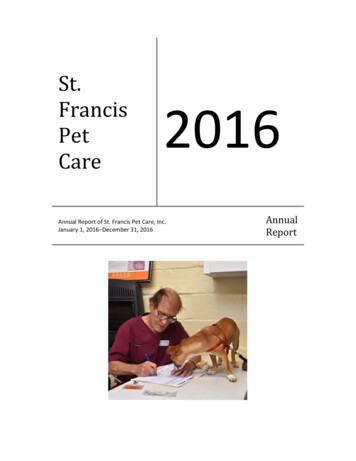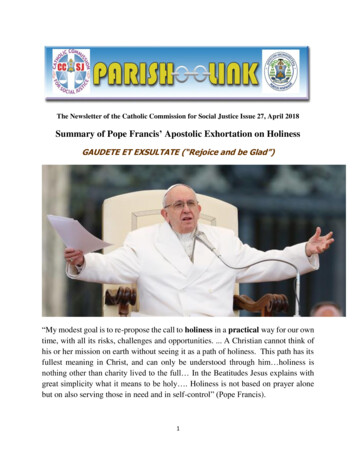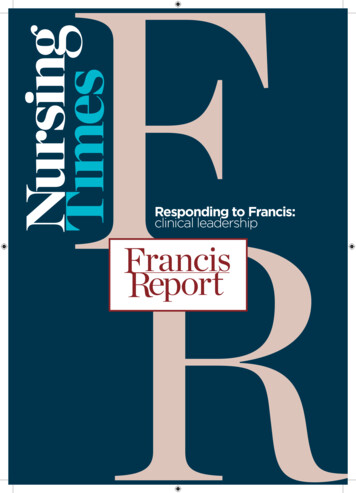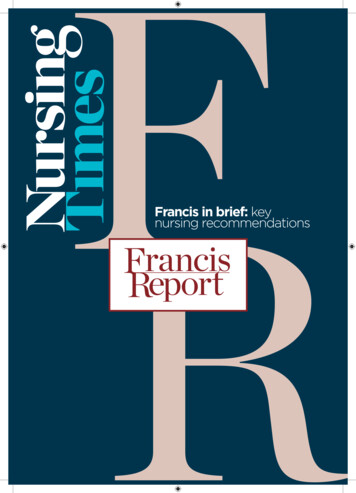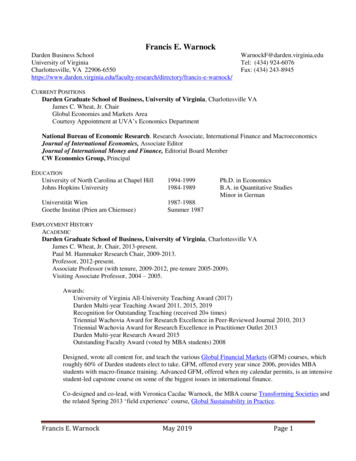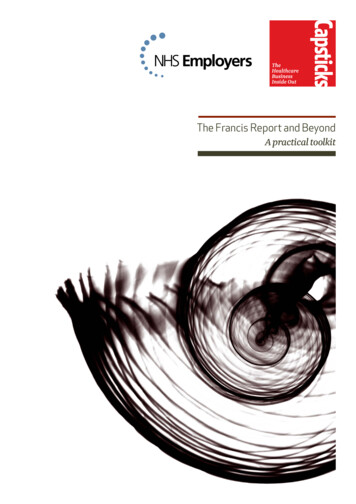
Transcription
The Francis Report and BeyondA practical toolkit
IntroductionNo-one in the field of healthcare can doubt the profound implications ofthe report by Robert Francis QC into failings at Mid-Staffordshire NHSFoundation Trust.In an NHS landscape that is already changing rapidly, the report calls for aseismic shift in the way organisations operate so that patients’ wellbeing isprioritised demonstrably and without exception.Some of the changes proposed by the Francis report are subject to governmentacceptance or legislation. Many are not – and acute trusts must show by the endof this year how they intend to respond.This toolkit is aimed at guiding trusts and other NHS bodies through thenecessary steps, with practical advice and pointers to the most useful resources.As well as explaining clearly the requirements and recommendations of theFrancis report, it sets out the existing framework of guidance and standards inkey areas including governance, board responsibilities, information-sharing andcomplaints.It draws on our long experience at Capsticks in supporting healthcareorganisations large and small through the challenges of NHS provision.We hope it will provide a comprehensive, easily-accessible and lasting aid torealising Robert Francis’ vision of best practice.Majid HassanPartner in Clinical Law at Capsticks Solicitors LLP
Contents1.Governance and internal reporting1.1Accountability for implementation of the recommendations1.2Putting patients first1.3Fundamental standards of behaviour1.4Common culture made real throughout thesystem – an integrated hierarchy of standard service1.5LeadershipPage11245722.12.2Information and external reportingInformation governanceReporting to regulators and commissioners99123Openness, transparency and candour1544.14.24.3Professional regulation and workforceResponsibility for and effectiveness of healthcare standardsTraining, education and developmentProfessional regulation of fitness to practise1818212455.15.2The patient interfaceEffective complaints handlingInquests2727306Resources list33
1. Governance and internal reporting1.1 Accountability for implementationof the recommendations(Recommendations 1 and 2)OverviewThe Francis report says that in order for its recommendationsto be implemented effectively, “every single person” servingpatients must contribute to a safer, committed, compassionateand caring service.It expresses concern that, while previous inquiries have beenwelcomed with “initial courtesy” - and with indications thatrecommendations will be accepted or viewed favourably – thereality is that progress towards implementation becomes slowor non-existent.The report’s first recommendation is that [pg 89 of 125]:“All commissioning, service provision, regulatory andancillary organisations in healthcare should consider thefindings and recommendations of this report and decide howto apply them to their own work.”In addition, the report recommends that: The Department of Health should collect and publishinformation at least once a year about organisations’decisions and actions in response to the Francis report; The House of Commons Select Committee on Health,which reports on the performance of health-relatedorganisations that are accountable to Parliament, shouldconsider incorporating into its reports a specific reviewof those organisations’ actions and decisions taken inresponse to Francis.The aim of these recommendations is to embed oversight of,and accountability for, the report’s recommendations. Theyseek to harness initial enthusiasm for real and positive changein the wake of the report.The report’s second recommendation states that:“The NHS and all who work for it must adopt and demonstratea shared culture in which the patient is the priority ineverything done.”They should then [pg 89 of 125]:The report calls for: Announce which recommendations they accept; A common set of core values and standards sharedthroughout the system; Explain what they intend to do to implement thoseaccepted; Publish information at least annually about their progress.This recommendation underlines the report’s view that allhealthcare organisations should account for their decisionsand actions - and that change will only happen if everyone whoworks with or on behalf of patients is engaged. Leadership at all levels from the ward to the top of theDepartment of Health, committed to and capable ofinvolving all staff with those values and standards; A system which recognises and applies the values oftransparency, honesty and candour; Freely available, useful, reliable and full information onattainment of the values and standards;1
quick links:Governance and internal reportingProfessional regulation and workforceInformation and external reportingThe patient Interface A tool or methodology to measure the “cultural health” ofall parts of the system.These points encapsulate what the Francis report deemsnecessary to change the culture of the NHS and deliver careappropriately.Each one is dealt with in detail later in this toolkit.The Government has accepted the recommendations aboutaccountability and implementation and has issued a call toaction for every part of the system.Jeremy Hunt, Secretary of State for Health has said:“Every individual, every team and every organisation needsto reflect with openness and humility about how they usethe lessons from what happened at Mid Staffordshire NHSFoundation Trust to make a meaningful difference to peoplewho use their services and their staff, and on how they aretransparent and honest in demonstrating the progress theymake to the public.”Foreword to Patients First and Foremost [pg 6-8 of 84]Checklist of practical steps Review the recommendations in the Francis report thatapply to your organisation and decide how to respond; State publicly by the end of 2013 the extent to which yourorganisation accepts the recommendations and what youintend to do to implement them;Openness, transparency and candourResources listHow Capsticks can help:We have extensive experience of working with NHS boards.We understand the critical role they play in shaping andexemplifying an organisational culture that is open,accountable and compassionate – and which putspatients first.We can: Run seminars offering new insights to boards, helping toensure they build transparent, accountable relationshipswith patients, staff and partner organisations; Undertake a range of diagnostic and development workwith your board to address some of the very real challengesthat follow the Francis report; Help create NHS boards that have robust, accountable,engaged and transparent corporate governancearrangements; Host a board seminar to go through action already takenand the points that still need to be addressed, so that thewhole board is involved in formulating the trust’s response; Review your action plan before publication to ensure it isclear, has missed nothing and is easily understandable; Work with you to help you compile your annual reporton progress. Publish at least annually information about progress; Liaise with other relevant NHS organisations about plansand progress.1.2 Putting the patient first(Recommendations 3 to 8)OverviewPutting the patient first is the theme which underpins theFrancis report.The report states: “The patients must be the first priority in allof what the NHS does. Within available resources, they mustreceive effective services from caring, compassionate andcommitted staff, working within a common culture, and theymust be protected from avoidable harm and any deprivation oftheir basic rights.”This section of the report echoes the Hippocratic Oath, underwhich doctors pledge to protect patients from harm andinjustice. The wording arises in part from the fact that patientsat the Mid-Staffordshire NHS Foundation Trust were found tohave been deprived of such basic rights as food and drink.Governance and internal reporting2
quick links:Governance and internal reportingProfessional regulation and workforceInformation and external reportingThe patient InterfaceOpenness, transparency and candourResources listThe Francis report says the NHS Constitution should be thefirst reference point for all NHS patients and staff. It shouldset out common values as well as rights, expectations andobligations.These include:The report states: “The overarching value and principle of theNHS Constitution should be that patients are put first, andeverything done by the NHS and everyone associated with itshould be informed by this ethos.”This has a section on shaping culture.In response, the Government has already published a revisedNHS Constitution that includes an increased emphasis oncommon values.The Francis report also says the NHS Constitution should setout patient expectations as follows: That staff will put patients before themselves; That staff will do everything in their power to protectpatients from avoidable harm; That staff will be honest and open with patients regardlessof the consequences for themselves; That where staff are unable to provide the assistance apatient needs, they will direct them where possible to thosewho can do so; That staff will apply the NHS values in all their work.The report recommends that NHS staff be expressly requiredto abide by the NHS values and constitution, with a writtencommitment that can be incorporated into contracts ofemployment. It says this should also apply to outsourcedcontractors and their staff.The Government has largely accepted these recommendationsin its response document, Patients First and Foremost.The Government will consult on further amendments to theNHS Constitution before responding in full to the Francisrecommendations.The existing framework The Healthy NHS Board 2013: Principles for GoodGovernance, NHS Leadership Academy, 2013. Quality in the new health systemMaintaining and improving quality from April 2013.“An organisation that is truly putting patients first will beone that embraces and nurtures a culture of openness andlearning.”Everyone counts: Planning for Patients 2013/14“The challenge facing the NHS is to become truly patientcentred.”The Berwick Report from the National Advisory Group on theSafety of Patients in England is a key document containingmany references to patients and their safety and examininghow to improve the current system.Checklist of practical steps Ensure that the NHS Constitution is prominent in yourorganisation and that copies are available for patients andstaff; Run training sessions for staff on what it means practicallyto “put patients first” and your expectations of theirbehaviour; Decide whether you will require your staff to enter intoan express contractual commitment to abide by the NHSvalues and the constitution and consider the consequencesof this; Decide whether you will require contractors providingoutsourced services to abide by NHS values and theconstitution and include it in contracts; Review the culture of your organisation and decidewhether changes are needed to make patients the priorityin all that you do.There are several publications that cover the importance ofchanging NHS culture to improve patient care and to ensurepatients’ voices are heard.Governance and internal reporting3
quick links:Governance and internal reportingProfessional regulation and workforceInformation and external reportingThe patient InterfaceHow Capsticks can helpWe can: Run a board workshop examining ways to shape yourorganisation’s culture and identify the best methods ofengagement with staff and service users. We can ensurefeedback from those groups helps you shape a responsiveand sustainable strategy and ensure accountability;Openness, transparency and candourResources list Carry out a staff survey to see whether NHS values areembedded in your workforce and help prepare an actionplan for change if necessary; Provide legal advice on how a commitment to abide by NHSvalues and the NHS Constitution could be incorporatedinto staff contracts and with contractors. Review your governance arrangements, shifting the focusbeyond paper reporting towards patients’ stories andexperiences with emphasis on real time reporting. Forexample, board members could join patient safety walkrounds and staff could take part in facilitated focus groups;1.3 Fundamental standards of behaviour(Recommendations 9 – 12)OverviewThe Francis report says all of those who work in the healthcaresystem should be committed to fundamental standards ofbehaviour enshrined in the NHS Constitution (see also 1.2Putting patients first).It says the constitution should also make clear that staff mustadhere to guidance and standards produced by their ownprofessional or regulatory bodies (see also 4.3 Professionalregulation of fitness to practise).The report recommends that healthcare professionalscontribute to the development of standards, and saysdisagreements about procedures must be resolvedappropriately. Reporting of incidents should be insistedupon and staff are entitled to feedback (see also 3 Openness,transparency and candour).Francis also urges professional bodies to draw up evidencebased standard procedures for as many interventions andpathways as possible.The existing frameworkThere are currently a number of codes of conduct whichapply to the NHS and which could form the basis for newfundamental behavioural standards.These include: The Code of Conduct and Code of Accountability in theNHS. This dates from 1994 (with subsequent revisions) andcovers NHS boards and individuals, setting out standardson probity and openness and public service values ofaccountability. The Professional Standards Authority rules for members ofNHS boards and clinical commissioning group governingbodies in England. This was published in 2012 and coverspersonal behaviour, technical competence and businesspractice. The NHS Foundation Trust code of governance, coveringstandards of behaviour for directors and
The Francis report says that in order for its recommendations to be implemented effectively, “every single person” serving patients must contribute to a safer, committed, compassionate and caring service. It expresses concern that, while previous inquiries have been welcomed with “initial courtesy” - and with indications that recommendations will be accepted or viewed favourably .
